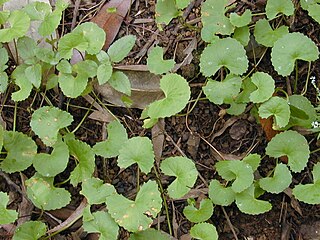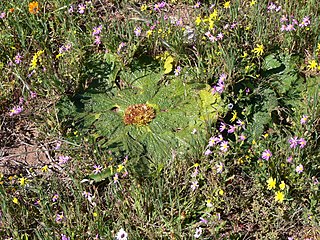
The Apiales are an order of flowering plants. The families are those recognized in the APG III system. This is typical of the newer classifications, though there is some slight variation and in particular, the Torriceliaceae may also be divided.

Conium is a genus of flowering plants in the family Apiaceae. As of December 2020, Plants of the World Online accepts six species.

Centella is a genus of 53 species of flowering plants in the subfamily Mackinlayoideae. The genus is sometimes placed in family Araliaceae; however, recent studies utilising molecular data place Centella within Apiaceae.

Afroligusticum elliotii is a member of the carrot family, Apiaceae. It is a perennial tuber, native to bamboo forests in west Tropical Africa. An endangered species, A. elliotii is most commonly found near Lake Kivu in Rwanda, but it has been observed as far north as Lake Albert in Uganda and as far south as Lake Tanganyika in Tanzania.

Alepidea is a genus of about 30 species in the family Apiaceae, all of which are endemic to Africa. They occur mainly in southern Africa, but can be found as far north as Ethiopia.
Anginon is a genus of flowering plant in the family Apiaceae. It is endemic to southern Africa.

Arctopus is a genus of flowering plant in the Apiaceae, with three species. It is endemic to southern Africa. The genus name means "bears foot" in reference to the curious growth habit, resembling a large footprint. The species were used in Khoisan medicine and adopted by the early settlers who gave them the Afrikaans name of sieketroos They are atypical members of the Apiaceae with the leaves growing flat on the ground and are dioecious, having separate male and female plants.
Choritaenia capensis is a species of flowering plant in the Apiaceae, of the monotypic genus Choritaenia. It is endemic to central parts of southern Africa. Individuals are usually reported from disturbed areas, such as roadsides, flood plains, and dry dams. It flowers in the spring and early summer. It is distinct for containing several morphological features that are not seen in any of the other genera of the family Apiaceae. Its fruits have a dense vestiture and hygroscopic carpophore that may be an adaptation that allows the plant to respond rapidly to the earliest spring rains.
Dasispermum are a genus of flowering plants in the family Apiaceae, native to coastal area of southern South Africa. Short-lived perennial or annuals, they are low-lying, often sprawling herbs with succulent or semi-succulent leaves, adapted to the dry, salty conditions of the littoral areas where they grow.
Billburttia is a genus of flowering plants belonging to the family Apiaceae.
Cynorhiza is a genus of flowering plants belonging to the family Apiaceae.
Notobubon is a genus of flowering plants belonging to the family Apiaceae.
Scaraboides is a genus of flowering plants belonging to the family Apiaceae.
Hermas is a genus of flowering plant in the family Apiaceae, native to Cape Provinces of South Africa.
Tana bojeriana is a species of flowering plant in the family Apiaceae, endemic to Madagascar. It is the only species in the monotypic genus Tana. The genus was first described in 1999, and the species was first described by John Gilbert Baker in 1890 as Peucedanum bojerianum.
Andriana is a genus of flowering plant in the family Apiaceae, endemic to Madagascar. The genus was first described in 1999.

Ben-Erik van Wyk FAAS is a South African professor of indigenous botany and traditional African medicine at the University of Johannesburg.






